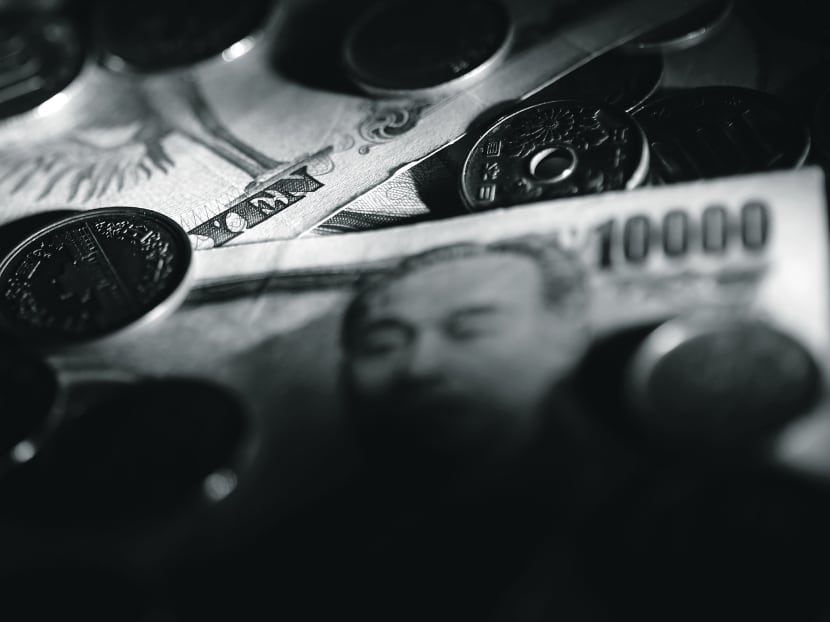Asia’s currency war remains hypothetical
Markets have been captivated by the prospect and imagery of a “currency war” following Japan’s dramatic shift in monetary policy, and the recent 20-per-cent depreciation of the yen. The narrative goes something like this: The sharp devaluation of the Japanese yen will be the casus belli which will provoke retaliatory devaluations by other Asian economies in self-defence.

Japan has, in fact, not explicitly devalued its currency through official intervention or other direct manipulation of the currency markets. Photo: Bloomberg
Markets have been captivated by the prospect and imagery of a “currency war” following Japan’s dramatic shift in monetary policy, and the recent 20-per-cent depreciation of the yen. The narrative goes something like this: The sharp devaluation of the Japanese yen will be the casus belli which will provoke retaliatory devaluations by other Asian economies in self-defence.
All very colourful, dramatic and scary, to be sure. But to date, this is purely hypothetical, and likely to remain so.
True, some North Asian currencies weakened suddenly earlier this year following the yen’s decline. But this move was largely driven by speculators anticipating a currency war, rather than by a counter-strike initiated by Asian policymakers.
There are three main reasons why we believe that Asia is not on the precipice of a currency war, and why Asian currencies are still more likely to strengthen than to weaken:
First, Japan has, in fact, not explicitly devalued its currency through official intervention or other direct manipulation of the currency markets. It has merely announced a policy programme to defeat deflation, setting an ambitious goal of achieving 2-per-cent inflation — the same inflation target as counterparts in the United States, the United Kingdom and the rest of Europe.
The method to achieve this is open-ended balance sheet expansion by direct central bank purchases of government debt and other assets. In other words, it is the same policy which the US Fed announced itself last September. This kind of increasingly common policy hardly makes for a first strike in a global currency war.
MORE HARM THAN GOOD
Second, until now, currency policy in the rest of Asia has merely slowed currency appreciation, rather than stopping or reversing.
If, in a hypothetical Asian currency war, policymakers were to match the yen’s pace and magnitude of depreciation, they would need to do much more and do it much differently.
Rather than to manage currency volatility, they would need to more directly manipulate currency markets. They might also need to enact capital controls, or engage in aggressive monetary easing.
But such policies, beyond backstopping currency competitiveness, could also trigger capital market instability, foreign capital flight or risk re-sparking inflationary bubbles, not to mention international rebuke. And for what gain? Asian exporters are already looking up because Chinese growth has been re-accelerating, the euro-zone recession is coming to an end, and the US capital investment cycle is picking up.
The reality is that Asia, in engaging in a currency war when exports are already picking up and inflation starting to firm, would do more harm than good to their own economies, exactly because currency weakness is unnatural and inappropriate for their current macroeconomic conditions.
The reverse is true for Japan, where currency weakness is justified by persistent deflation, weak exports and the need for extraordinary monetary easing.
THE ORDINARY REALITY
Third and finally, if this new Japanese monetary policy were to truly result in an ongoing weakening of the yen, it will be because Japanese investors themselves are investing in greater numbers abroad, selling their own currency in the process.
The net result — increased global liquidity and increased capital flows from the weak to the stronger growing economies — has proven to be positive, not negative, for emerging market currencies.
Therefore, while it may be exciting to paint a picture of Asia overshadowed by the clouds of currency war, the reality is much more ordinary.
Asian currencies, in a global environment where growth is recovering and where global central bank balance sheet policy is causing a global search for yield, must inevitably strengthen.
And for Asian policymakers to mobilise for currency war, where there is no advantage, nothing to gain, and where there is no danger, it is not only unenlightened, but is also unlikely.
Daniel Hui is Executive Director and Head of Emerging Asia Currency Strategy at JP Morgan in Singapore.






